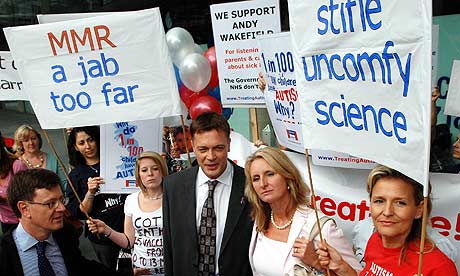Wakefield GMC Hearing 2007 The Greek Chorus (Unauthentic journalism)
From the Lancet to the GMC: how Dr Andrew Wakefield fell from grace
Sarah Boseley charts
the downfall of the consultant whose report led to a drop in MMR uptake and
divided medical opinion
28 January 2010
http://www.guardian.co.uk/science/2010/jan/28/andrew-wakefield-downfall

Dr Andrew Wakefield (centre) and his wife, Carmel (2nd right), arrive at the General Medical Council hearing which found he showed a 'callous disregard' for the suffering of children in his MMR research. Photograph: Steve Parsons/PA
It all began with a paper published in the prestigious Lancet medical journal in February 1998.
The paper caused a massive slump in the numbers of children being vaccinated against measles, mumps and rubella and the repercussions are still with us now – MMR uptake has never completely recovered.
The authors were Dr Andrew Wakefield, Dr Simon Murch and Professor John Walker-Smith, who were all at the time working at the Royal Free hospital in London.
Wakefield was the lead author of the study and chief proponent of the theory that there was a link between the MMR jab, given to children around the age of 18 months and again at four years, and a form of bowel disease and autism. The paper was a collection of just eight case studies of children.
The Lancet paper conceded that the battery of medical tests to which the children were subjected had not established a link, but even the suggestion that the jab could be responsible for autism caused a furore, which worsened when Wakefield suggested to a press conference held to coincide with publication that children should be given the three jabs separately and at least a year apart.
The scientific establishment struggled in vain to produce evidence that would reassure the public. Studies were commissioned and published showing that there was no major difference in the rate of autism among cohorts of children before and after the combined jab was introduced in the UK, but Wakefield stuck to his guns and claimed that others had replicated his findings.
The Royal Free and Wakefield parted company, and the surgeon turned gastroenterologist left for the US. Vocal supporters, who include anti-vaccination campaigners, claimed he was the subject of a witchhunt and said he had been hounded out of the country. They claim he is the victim of an establishment in league with the pharmaceutical industry.
The story took a new turn with revelations that Wakefield had received legal aid funding to carry out his study, through lawyers acting for children whose parents believed their autism was caused by the MMR jab and wanted to sue the manufacturers. It was alleged that he had not revealed this to the Lancet, which then retracted part of the paper.
Subsequent investigations by the General Medical Council resulted in a lengthy charge sheet for all three doctors involved in the study. These centred on alleged inadequate ethical approval for the study. The doctors are charged with putting children through invasive and uncomfortable tests, including colonoscopies and brain scans, which they did not need in order to try to prove Wakefield's theory.
Opinion is divided in the medical establishment on the wisdom of pursuing Wakefield – and particularly his colleagues who played a lesser role in the drama – at the GMC. Some say there was a clear case to answer and that the GMC had no other option but others believe that no good can come of it.
The latest Health Protection Agency figures show that uptake of MMR is 85%, which is still insufficient to ensure immunity in the community. Before the MMR scare, uptake stood at 92%.